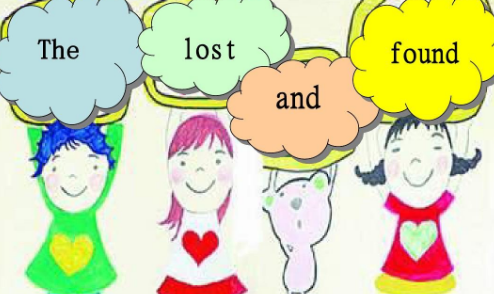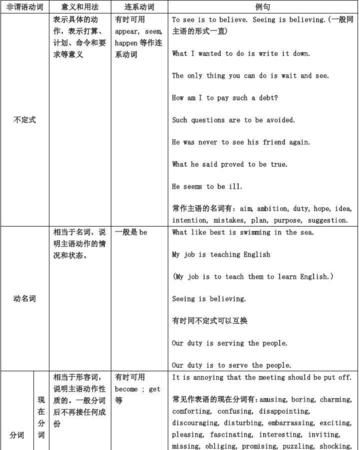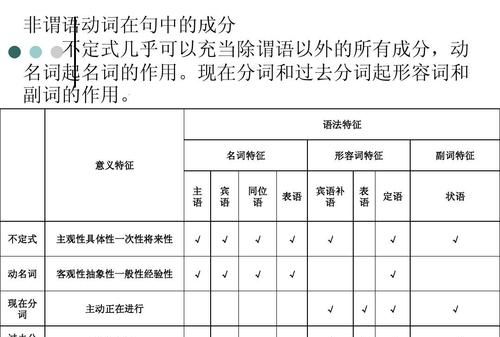本文目录
非谓语动词作宾语补足语的例句
1
不定式做宾补
i
ask
you
to
adopt
the
question
2
感官动词的不定式做宾补,但是省略to
i
often
see
a
girl
dance
next
door
3
现在分词做宾补
i
find
you
somking
next
door
4
某些动词接to
do做宾补,但是正常的句子中看不到,因为通常使用其被动语态形式。动词有:think,
believe,
guess,
consider,
say,
report等。
(最原始句为:People
think
Bell
to
invent
the
telephone.)此句不符合惯例,因此改为被动语态:(Bell
is
thought
to
invent
the
telephone.)此句虽符合惯例,但是由于Bell是一位名人并已离世,他所做的事情早就发生了,是先于“人们认为”发生,因此宾补的不定式要改为完成式to
have
done,因此最终的句子为Bell
is
thought
to
have
invented
the
telephone.考试会考to
have
invented这一部分,但不是常考点。
上面给你列了个提纲,只要你理解之后,那么,别说是10个句子,100个,1000个你也可以造了
满意采纳,不满意继续追问

非谓语动词作宾语知识点
非谓语动词作宾语如下:

非谓语动词是可以充当宾语的,具体内容如下。
非谓语动词,又叫非限定动词,非 谓语动词是指在句子中不是谓语的动词,主要包括不定式、动名词和分词( 现在分词和过去分词),即 动词的非谓语形式。非谓语动词也是动词的一种,他们有着动词的其他特点,可以充当主语、宾语、 状语等。非谓语动词与谓语动词是相对的概念。

综上所述,非谓语动词充当宾语的区别在于它是一个动词短语。
动词后面的非谓语动词可能是作宾语,也可能不是作宾语。
写出感官动词后面非谓语动词做宾补的形式并写清楚分别表示什么含义
概述:常见的感官动词see/watch/hear/smell/feel, 后面要跟非谓语做宾语补足语的话,这些感官动词只能是实义动词,而不是系动词。非谓语动词包含三种:不定式to do, 现在分词doing, 过去分词done。举例说明如下:
I heard a baby crying when I entered the house.
现在分词crying做宾语补足语,与baby构成主动关系,也表示进行,正在哭。
当我进屋时,听见小孩正在哭泣。
I saw the thief break into the house.
省略to的不定式,即动词原形短语break into the house做宾语补足语,表示thief与break构成主动关系,动词原形表示动作已经发生。
我看见小偷闯进了房子。
I heard my name called in the street.
过去分词called做宾语补足语,call与my name构成被动关系,也表示call这个动作已经发生。
我听见有人在街上喊我的名字。

非谓语动词作宾语的四种类型
以下是我为大家整理的非谓语动词作宾语的用法归纳,希望能帮助大家更好掌握这类单词,提高英语水平。
类型一:习惯上要接不定式作宾语的动词
下列动词习惯上可接不定式作宾语,但不能接动名词作宾语:
afford 付得起 agree 同意 apply 申请 arrange 安排
ask 要求care 想要 choose 选择 decide 决定
demand 要求desire 请求 determine 决心 expect 期待
help 帮助hope 希望 intend 打算 manage 设法
offer 主动提出 plan 计划 prepare 准备pretend 假装
promise 答应refuse 拒绝 want 想要 wish 希望
请看以下典型用例:
She walked up to the desk and asked to see the manager. 她走到办公桌前要求见经理。
If you would care to leave your name, we’ll get in touch as soon as possible. 请留下您的名字,我们将尽快与您联系。
He applied to be transferred. 他申请调动工作。
There have been fewer problems for travelers who chose to fly. 对于选择乘飞机旅游的人来说问题更少。
After much discussion they decided to accept our offer. 经过反复讨论,他们决定接受我们开的价。
If I fail to appear by 7 o’clock, I will not be coming at all. 如果我七点钟不到,我就不会来了。
I wanted to speak to the manager but I got his secretary instead. 我想找经理说话,可是接电话的是他的秘书。
类型二:习惯上要接动名词作宾语的动词
下列动词习惯上可接动名词作宾语,但不能接不定式作宾语:
admit 承认 advise 建议 allow 允许 appreciate 感激
avoid 避免 consider 考虑delay 推迟 deny 否认
discuss 讨论dislike 不喜欢 enjoy 喜爱 escape 逃脱
excuse 原谅 fancy 设想 finish 完成 forbid 禁止
forgive 原谅give up 放弃imagine 想像keep 保持
mention 提及mind 介意 miss 没赶上pardon 原谅
permit 允许 practise 练习prevent 阻止?摇prohibit 禁止
put off 推迟report 报告 risk 冒险stop 停止
suggest 建议understand 理解
请看以下典型用例:
I admit breaking the window. 我承认窗户是我打破的。
We do not allow/permit smoking in the kitchen. 我们不允许在厨房里吸烟。
I appreciate being given this opportunity. 非常感谢给了我这个机会。
I avoided mentioning the subject in case he should be offended. 我回避提及这个问题,以免触犯他。
He suggested taking the children to the zoo. 他提议带孩子们去动物园。
【说明】advise, allow, forbid, permit 这四个动词之后,虽然不能直接跟不定式作宾语,但可接不定式作宾语补足语。如:
The doctor advised me to stay in for a few days. 医生嘱我在家休息几天。
The nurse allowed him to remain there, though it was not permitted. 护士让他留在那儿,而按规定那是不允许的。
My father forbade me to watch TV. 我父亲不准我看电视。
Permit me to introduce myself. 请允许我介绍自己。
而有些动词(如 consider, understand, discuss)则可接“疑问词+不定式”作宾语。如:
Have you considered how to get there? 你是否考虑过如何到那儿去?
She doesn’t understand how to look after him. 她不知道应如何照顾他。
We discussed what to do and where we should go. 我们讨论了该怎么办以及到哪里去。
类型三:既可接不定式也可接动名词作宾语的动词
1. 有的动词既可后接不定式作宾语,也可后接动名词作宾语,两者意思基本相同,有时甚至可以互换。这类动词主要有:
like 喜欢love 喜欢 hate 憎恨prefer 宁可
bother 麻烦 intend 打算 attempt 试图cease 停止
begin 开始 start 开始 continue 继续
can’t bear 不能忍受
请看以下典型用例:
They continued to meet [meeting] daily. 他们继续每天都见面。
I like keeping [to keep] everything tidy. 我喜欢将每件东西都保持整洁。
I hate (having) to tell you, but I’ve damaged your bicycle. 很抱歉地告诉你,我把你的自行车弄坏了。
She never ceased complaining [to complain] about prices. 她没完没了地抱怨物价。
【注意】当 like, love, hate, prefer 与 would, should 连用时,其后习惯上只能接不定式,不能接动名词。
2. 有的动词既可后接不定式作宾语,也可后接动名词作宾语,两者意思不同,使用时要注意区别(这类动词往往是高考经常要考查的一类动词)。这类动词主要应注意以下几类。
(1) remember(记得),forget(忘记),regret(后悔)后接不定式指该不定式所表示的动作还未发生,后接动名词(有时可用完成式),则指该动名词所表示的动作已经发生。比较:
Remember to turn off the lights before you go to bed. 临睡前别忘了关灯。
I remember reading about the earthquake in the papers. 我记得在报纸上看到过关于这次地震的消息。
Don’t forget to turn down the gas after an hour or so. 别忘了过一小时左右把煤气关小点儿。
I shall never forget seeing the Great Wall for the first time. 我永不会忘记第一次看见长城的情景。
I regret to say the job has been filled. 十分抱歉,那个工作已经有人做了。
I regret saying what I said. I shouldn’t have said it. 我懊悔讲了我讲的话。我是不应当那样讲的。
(2) try 后接不定式表示设法做某事,接动名词表示做某事试试(看有什么效果)。如:
You shouldn’t try to leave the restaurant without paying. 你不应该试图不付账就离开饭店。
You really must try to overcome your shyness. 你确实需要努力克服你的腼腆。
(3) mean 后接不定式表示打算(想要)做某事,接动名词表示意味着(要)做某事。如:
To mean to do something and to actually do something are two different things. 打算做一件事和实际上做一件事完全是两回事。
If we mean to catch the early bus, that means getting up before five. 要想赶早班车,我们就得在5点钟以前起床。
(4) stop 后接动名词表示停止做某事,接不定式表示停下正在做的事去做另一事(注意:后接不定式时,不定式不是宾语,而是目的状语)。如:
He stopped speaking, and there was not a sound in the room. 他停止讲话,房里一点声音也没有了。
The bus stopped to take on more passengers. 公共汽车停下来让乘客上车。
(5) can’t help后接动名词表示禁不住去做某事,接不定式表示不能帮助做某事。如:
She’s a funny girl, but you can’t help liking her. 她是一个奇怪的姑娘,但你禁不住会喜欢她。
The medicine can’t help to get rid of your cold. 这药不能帮你治好感冒。
(6) go on 后接不定式表示做完某事后接着做另一事,接动名词表示继续做正在做的事。如:
The minister went on talking for two hours. 部长一连谈了两个小时。
The minister went on to talk about foreign policy. 部长接着就谈外交政策。
注:也有人认为 go on doing sth 中的 doing 是现在分词而不是动名词。
类型四:非谓语动词用作介词的宾语
在通常情况下,动词用作介词的宾语时,要用动名词形式,不能用不定式。如:
Besides doing the cooking I look after the garden. 除了做饭外,我还得管园子。
She was late because of missing the bus. 她迟到了,因为没有赶上公共汽车。
You should think twice about employing someone you’ve never met. 你要雇用素未谋面的人应三思而行。
但是,当非谓语动词位于 but, except 后作宾语时,习惯上要用不定式,并且,当其前有动词 do 时,则不定式不带 to;若其前没有动词 do,则不定式通常带 to。如:
We had no choice but to wait. 我们除了等待之外别无选择。
He never did anything but watch TV. 除了看电视,他从不干任何事。
It had no effect except to make him angry. 除惹他生气外,没产生任何效果。
I could do nothing except agree. 我除了同意,没有别的办法。
【专项训练】
1. I mustn’t annoy my boss because I can’t afford _____ my job.
A. losingB. to lose C. to have lost D. having lost
2. We arranged to meet at the cinema at 7.30, but he failed _____ .
A. to turn upB. to turn down C. turning up D. turning down
3. I wouldn’t have offered _____ the plants if I’d known there were so many.
A. to water B. watering
C. watered D. to have watered
4. Imagine _____ the answer to such an easy question!
A. not to know B. not knowing
C. to not knowD. not knew
5. They shouldn’t allow _____ here; the street is too narrow.
A. to park B. parkedC. being parked D. parking
6. She imagined _____ into the office and everyone what she thought of them.
A. walking, telling B. to walk, to tell
C. to walk, telling D. walking, to tell
7. Peter, who had been driving all day, suggested _____ at the next town.
A. to stop B. stopped
C. stopping D. having stopped
8. It annoys me when people forget _____ “thank you”.
A. sayingB. having saying
C. to sayD. to have said
9. I forgot _____ a pen. Can you lend me one?
A. bringing B. to bring
C. having broughtD. to have brought
10. If you’re writing to your mother, don’t forget _____ something about her coming to stay.
A. to put inB. putting in
C. to gave put inD. having put in
11. We regret _____ passengers that the l4.50 train for Cardiff will leave about 37 minutes late.
A. to informB. informing
C. informedD. having informed
12. She stopped _____ about her illness and went on _____ us about all her other problems.
A. talking, tellingB. to talk, to tell
C. talking, to tellD. to talk, telling
13. He began by _____ us where the island was and went on _____ us about its climate.
A. showing, telling B. to show, to tell
C. showing, to tell D. to show, telling
14. — Robert is indeed a wise man.
— Oh, yes. How often I have regretted _____ his advice!
A. to take B. takingC. not to takeD. not taking
15. — Can I smoke here?
— Sorry. We don’t allow _____ here.
A. people smoking B. people smoke
C. to smokeD. smoking
【参考答案】
1—5 BAABD6—10 ACCBA11—15 ACCDD

以上就是关于非谓语动词作宾语例句,非谓语动词作宾语补足语的例句的全部内容,以及非谓语动词作宾语例句 的相关内容,希望能够帮到您。

